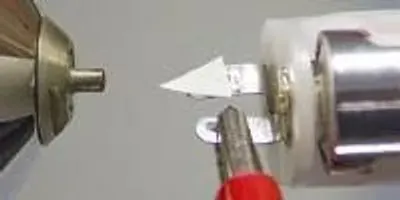Researchers found that when paper used to collect a sample was coated with carbon nanotubes, the voltage required was 1,000 times reduced, the signal was sharpened and the equipment was able to capture far more delicate molecules.
A team of researchers from Purdue University and the Indian Institute of Technology Madras performed the study, which is detailed in a designated "very important paper" by the journal Angewandte Chemie.
"This is a big step in our efforts to create miniature, handheld mass spectrometers for the field," said R. Graham Cooks, Purdue's Henry B. Hass Distinguished Professor of Chemistry. "The dramatic decrease in power required means a reduction in battery size and cost to perform the experiments. The entire system is becoming lighter and cheaper, which brings it that much closer to being viable for easy, widespread use."
Cooks and Thalappil Pradeep, a professor of chemistry at the Indian Institute of Technology Madras, Chennai, led the research.
"Taking science to the people is what is most important," Pradeep said. "Mass spectrometry is a fantastic tool, but it is not yet on every physician's table or in the pocket of agricultural inspectors and security guards. Great techniques have been developed, but we need to hone them into tools that are affordable, can be efficiently manufactured and easily used."
The National Science Foundation-funded study used an analysis technique developed by Cooks and his colleagues called PaperSpray™ ionization. The technique relies on a sample obtained by wiping an object or placing a drop of liquid on paper wet with a solvent to capture residues from the object's surface. A small triangle is then cut from the paper and placed on a special attachment of the mass spectrometer where voltage is applied. The voltage creates an electric field that turns the mixture of solvent and residues into fine droplets containing ionized molecules that pop off and are vacuumed into the mass spectrometer for analysis. The mass spectrometer then identifies the sample's ionized molecules by their mass.
The technique depends on a strong electric field and the nanotubes act like tiny antennas that create a strong electric field from a very small voltage. One volt over a few nanometers creates an electric field equivalent to 10 million volts over a centimeter, Pradeep said.
"The trick was to isolate these tiny, nanoscale antennae and keep them from bundling together because individual nanotubes must project out of the paper," he said. "The carbon nanotubes work well and can be dispersed in water and applied on suitable substrates."
The Nano Mission of the Government of India supported the research at the Indian Institute of Technology Madras and graduate students Rahul Narayanan and Depanjan Sarkar performed the experiments.
In addition to reducing the size of the battery required and energy cost to run the tests, the new technique also simplified the analysis by nearly eliminating background noise, Cooks said.
"Under these conditions, the analysis is nearly noise free and a sharp, clear signal of the sample is delivered," he said. "We don't know why this is – why background molecules that surround us in the air or from within the equipment aren't being ionized and entering into the analysis. It's a puzzling, but pleasant surprise."
The reduced voltage required also makes the method gentler than the standard PaperSpray™ ionization techniques.
"It is a very soft method," Cooks said. "Fragile molecules and complexes are able to hold together here when they otherwise wouldn't. This could lead to other potential applications."
The team plans to investigate the mechanisms behind the reduction in background noise and potential applications of the gentle method, but the most promising aspect of the new technique is its potential to miniaturize the mass spectrometry system, Cooks said.
Cooks is a pioneer in mass spectrometry and has worked for years to take mass spectrometers from the size of a car to that of a shoebox.
Early in his career he developed ambient ionization techniques that allowed testing to be done in the air or directly on a surface in its natural environment, as opposed to conventional mass spectrometry techniques that required chemical separations, manipulations of samples and containment in a vacuum chamber for ionization and analysis. Ambient ionization paved the way for faster, more portable mass spectrometry devices that could be used outside of a laboratory.
Cooks and his collaborator Zheng Ouyang, Purdue associate professor of biomedical engineering and electrical and computer engineering, have created several generations of miniature mass spectrometers. They recently published papers on the latest generation, the "Mini 12," in the journal Analytical Chemistry.
Cooks and his team have fine-tuned the tools for use in molecular imaging for cancer diagnostics and surgery; therapeutic drug monitoring; testing for biomarkers in urine; and the identification of food-borne pathogens, bacteria, pesticides and explosives residues.
Cooks is associated with several Purdue research centers, including Bindley Bioscience Center, the Purdue Center for Cancer Research and the Center for Analytical Instrumentation Development.













